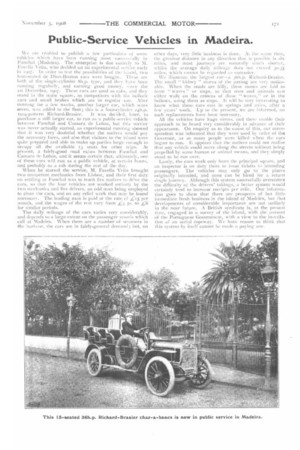Public-Service Vehicles in Madeira.
Page 5

If you've noticed an error in this article please click here to report it so we can fix it.
We are enabled to publish a few particulars of some vehicles. which have been running most successfully in Funchal (Madeira). The enterprise is due entirely to M. Faye Veiia, who decided on an experimental service early in 19°7. In order LO test the possibilities of the island, two four-seated de Dion-Bouton cars were bought. These are both of the single-cylinder 8h.p. type, and they have been running regularly, and earning good money, since the 1st December, 19..17. These cars are used as cahs, and they scand in the main square,. as competitors with the bullock cars and small brakes which are in regular use. .\fter runningfor a few weeks, another larger car, which seats seven, was added to the fleet; this is a four-cylinder 24h.p. 19(4-pattern Richard-Brasier. It was decided, later, to purchase a still larger car, to run as a public-service vehicle between Funchal. and Camara de Lobos, but this set-vice was never actually started, as experimental running showed that it was very doubtful whether the natives would pay the necessary fares, and also that visitors to the island were quite prepared and able to make up parties largo enough to occupy all the available 13 seats for other trips. At present, a fairly-good road exists between Funchal and Camara dc.' Lobos, and it seems certain that, ultimately, one of these cars will run as a public vehicle, at certain hours, and probably as a cab during the rest of the day.
When he started the service, M. Fayella Vella brought two competent mechanics from Lisbon, and their first duty on settling at Funchal was to teach live natives to drive the cars, so that the four vehicles are worked entirely by the two mechanic's and Five drivers, an odd man being employed to clean the cars, and on any relief work that may be found necessary. The leading man is paid at the rate of .4:15 per month, and the wages of the rest vary from .4;3 5s. to ,.;;;6 for similar periods.
The daily mileage of the cars varies very considerably, and depends to ii large extent on the passenger vessels which call at 'Madeira. When there are a number of simmers in the harbour, the cars are in fairly-general demand; but, on
other days, very little business is done. At the stone time, the greatest distance in any direction that is possible is six miles, and most journeys are naturally much shorter, whilst the average daily mileage dc.m.is nor es:cc:Q(1 30-35 mites, which cannot be regarded as excessive.
We illustrate the largest car—a 36h.p. Richard-Brasier. 'the small " kidney " stones of the paving are very noticeable. When the roads are hilly, these stones are laid to form n waves " or steps, so that men and animals curt either walk on the crowns of these " ‘vaves," or in the hollows, using them as steps. It will be very interestingto know what these cars cost in springs and axles, after a few years' work. Up to the present, we are informed, no such replacements have been necessary.
All the vehicles have huge sirens, and these enable their approach to be heard very considerably in advance of their appearance. On enquiry as to the cause of this, our correspondent was informed that they were used by order of the Governor, as so many people were killed when the cars began to run. It appears Linn: the natives could not realise that any vehicle could move along the streets without being propelled by Suffic human or animal means, and they simply stood to be run over.
Lastly, the cars work only from the principal ,q1LiiIIT, and an inspector is on duty there to issue tickets to intending passengers. The vehicles may only go to the places originally intended, and none can be hired for a return single journey. Although this system successfully overcomes the difficulty of the drivers' takings, a better system would certainly tend to increase receipts per mile. Our information goes to show that there are prospects of but little immediate fresh business in the island of Madeira, but that developments of considerable in-iportanoe are not unlikely in the near future. A British syndicate is, at the present time, engaged in a survey of the island, with the consent of the Portuguese Government, with a view to the. installation of an aerial ropeway. We have reason to think that this system by itself cannot ix' inade a paying one.




















